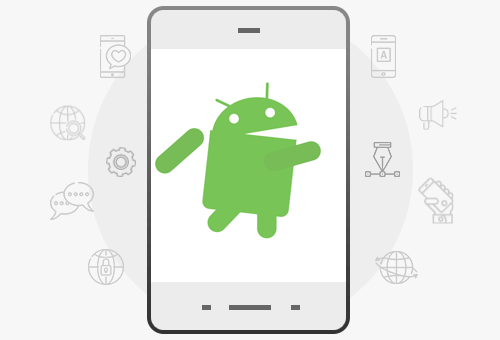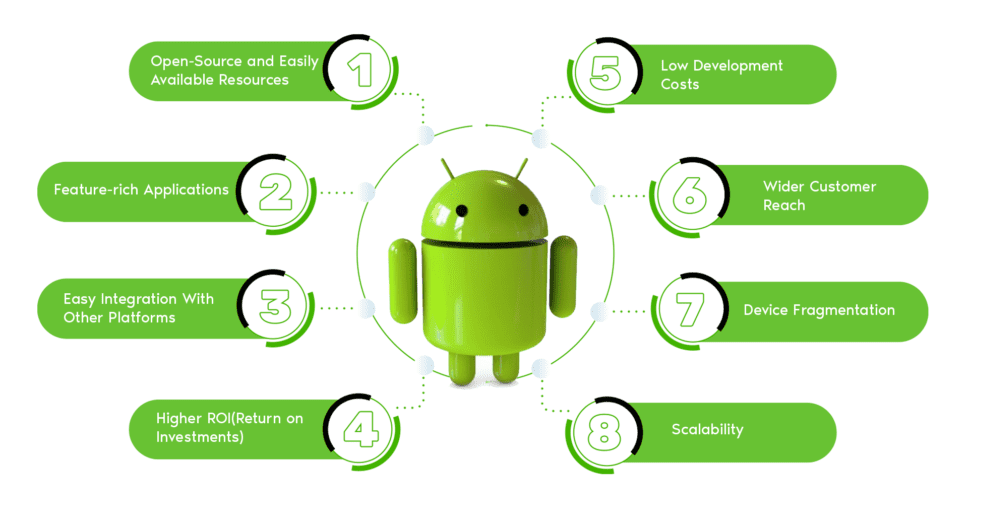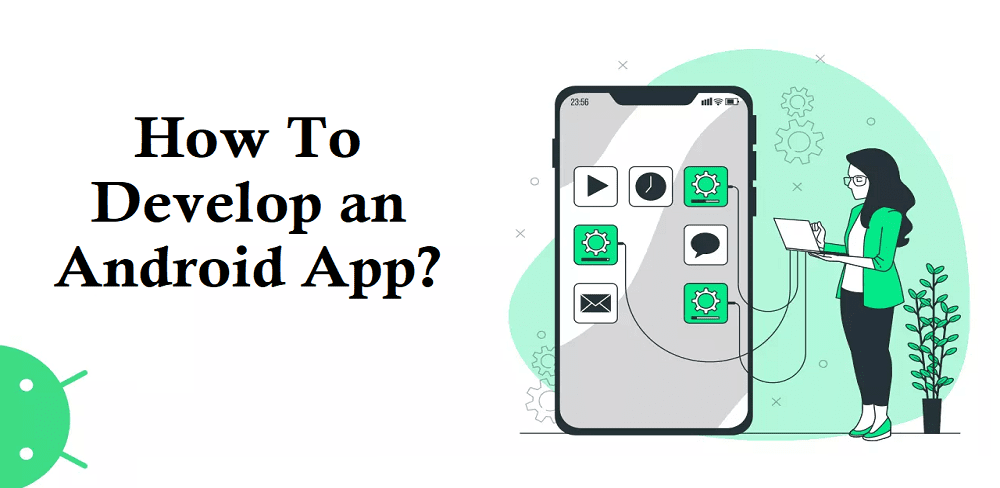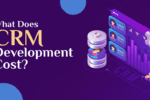Are you planning to develop an Android app for your business? You may want to increase your sales or have your business accessible to a wider audience. Or, you might want to automatically equip items in high demand.
Android is a great platform for your first mobile app. Developing an Android app is used by over 2 billion people worldwide, so developing it will help you reach more employees, customers, and partners.
Google Android is the most popular mobile operating system in the world. Android development is different from iOS, which only works on specific devices. You can develop Android apps with almost any desktop computer or laptop.
Do you want to learn more about Android app creation? We’ve got all the information you need in this blog about what Android app development is and how an app can be developed. Let’s start.
What is Android App Development?

The process is to make the app specifically for Android, which is used on millions of devices worldwide. Android apps are available for various purposes, including social networking, games, and e-commerce.
They can also be used as productivity tools. Android app development includes coding the app in programming languages like Java or Kotlin.
It also involves testing the app for different devices and platforms and publishing it on the appropriate app markets. It is an important process in the market that helps developers create useful and innovative apps for users.
Market Stats To Look At!
- Number of Android applications on Google Play Store (as of September 2021): over 3.48 million
- Downloads of Android apps in 2021 will reach 131 billion.
- In 2021, global consumer spending on Android applications will be $66.1 billion.
- The top category of downloads from Google Play is Games (33%)
- Social media is the top category of Google Play by spending.
- The average number of Android users per month: over 2.5 billion.
- Android’s share of the global mobile operating system market: 71%.
- Android developers worldwide: over 4 million.
How to Develop an Android App?
Are you tired of searching “how to develop an android app”? Then don’t look further than here. This guide will teach you how to develop an Android app. This guide will take you through the key steps of creating a successful mobile application, from ideation and testing to coding.
1. Plan the App:
The first step in app development is to have a vision to develop an Android app. What will you include in your app? The platform you choose should be able to provide a service to Android app users.
Knowing the target audience before developing an Android app is important, as this will help with other decisions. Focus on the wireframe, the blueprint for the final Android app. The wireframe should include all relevant information, such as the audience target, the app’s goal, and the vision to develop an Android app. It also includes the genre, features, and the genre.
2. Select the Right Development Tool:
The demand for Android apps is increasing as the number of Android devices increases. If you want to know how to develop an app for Android, it’s important to create one that is unique, feature-rich, and responsive.
To achieve this, it is crucial to use some of the best Android development tools available, such as Android Studio, React Native, Xamarin, Flutter, Java, and more. The developer should choose the appropriate tool based on the business application’s specific requirements to ensure an Android app’s successful development.
3. Designing the User Interface:
The first impression users have of your app is through the user interface. Developing an Android app with a unique interface is important to attract more users. It requires careful planning and execution. It is important to assemble a team of proficient UI specialists.
These experts can design visually appealing and user-friendly interfaces. These experts handle a variety of visible components such as layouts, icons and colors, typography, and interactive elements. A well-coordinated design team enhances the UI of an Android app.
4. Code the App:
Coding is the most important part of app development. If you want to make your ideas a reality and develop an Android app, you need to hire an Android app developer with expertise in the programming language that aligns with your chosen platform. This complex process demands both time and skill. The development of an Android app requires the proficiency of a skilled developer.
Your choice of programming language will significantly impact app performance, user experience, and scalability. Thus, the developer’s ability to effectively use the chosen language is crucial in creating a robust, efficient app that can thrive in the highly competitive mobile app market.
5. Test the App:
It’s important to test the app thoroughly after it has completed its coding phase to develop an Android app. Testing allows teams and developers to find any loopholes, bugs, or performance problems that may have arisen during development. Developers can fix these issues by conducting thorough testing to develop an Android app.
It will ensure that the app works as intended and provides a seamless experience for users. This testing phase reduces the chance of critical issues occurring when the app is released to the public. It also improves its quality and user satisfaction.
What Are the Benefits of Android App Development For Small And Large Businesses?

Android is a great tool for small and large businesses to develop an Android app. Android is used to increase brand value and solve customer issues. How does Android app development help small and large businesses to develop an Android app? As a developer, you should be aware of these advantages.
1. Low Cost, High ROI:
You can increase user engagement with Android apps by investing a small amount in developing an Android app. You can offer an interactive experience to the users in return for a higher ROI to develop an Android app.
2. Rapid Deployment:
The development cycle for an Android application is fast. It means that any app developer could develop a full Android app application in a matter of hours. The versatility of Android apps is also integrated into the entire system. Android apps can be deployed faster, allowing businesses to increase their scalability.
Android apps allow for integration with emerging and new technologies. New technologies, such as IoT and Virtual Reality. Android’s flexibility allows software companies the freedom to create the best possible solution.
3. Multi-Platforms:
Java is the language commonly used for developing Android apps, which enables them to be ported across various platforms. Android apps can be integrated with platforms such as Symbian or Ubuntu, offering versatility and broader reach.
For small and large companies, it is highly beneficial to hire hybrid app developers proficient in Android development, as it allows them to leverage multiple platforms, expanding their app’s potential audience and increasing market presence.
4. The Scalability and Versatility of the System:
Android Studio is now more flexible and adaptable for developers, making it an excellent choice when looking to hire mobile app developers. With Android Studio, developers can easily create and integrate Android apps into the entire Android ecosystem, including smartphones and Android TVs.
Additionally, it provides compatibility with emerging technologies such as the Internet of Things (IoT) and Augmented Reality (AR), expanding the possibilities for innovative app development. Android’s versatility and scalability as a platform make it an attractive option for businesses looking to develop cutting-edge mobile applications with the help of skilled mobile app developers.
5. Enhance Security:
Safety and reliability are two of the most important reasons to choose Android. These are exceptional benefits for business. FOR EXAMPLE, Android P (Pie) comes with additional security features.
It can also protect your device against malware and viruses. Android platforms continue to improve in security. Android app development should be the priority for users to achieve enhanced security.
6. Customization:
Google gives User Interface (UI) priority in its Android platform, making it an appealing choice for Android app developers for hire. The Android OS’s customizable nature provides businesses with unlimited opportunities to create unique and tailored user experiences.
Software developers and enterprises can leverage this flexibility to create captivating UI designs and offer enhanced app functionality. Android’s versatility allows developers to create interesting and diverse applications catering to user needs and preferences.
This adaptability makes Android a popular and sought-after platform for hiring Android app developers who can deliver innovative and user-centric mobile applications.
How Much Does It Cost To Build An Android App?
Costs for building Android apps can vary greatly depending on several factors. These include the complexity of the application, the features, and functionality needed, the approach used to develop an Android app, as well as the location of the team, and the expertise of its members. Here are a few key factors affecting the cost of developing an Android app.
1. App Complexity:
Simple apps with basic functions will cost less than complex apps with extensive features and require integration with databases, third-party services, APIs, and other third parties.
2. Design:
Costs can be affected by the design of an app’s interface (UI) or user experience (UX). Custom animations and designs will increase development costs.
3. Development Approach:
App development can be done in a variety of ways, including native (using Java for Android or Kotlin), cross-platform (using frameworks such as React Native or Xamarin), or hybrid (using technologies such as Cordova or Xamarin). Costs can be affected by the choice of approach.
4. Backend Development:
The development and hosting costs will be affected if the app needs a server to store data, process it, or provide real-time functionality.
5. Third-Party Integrations:
Additional costs may be incurred if you incorporate third-party services such as payment gateways or social media logins.
6. Testing and Quality Assurance:
It is important to thoroughly test and ensure the app is bug-free. It will add to the development costs.
7. Developer’s Location:
The differences in labor costs between regions and countries affect the development rates of different countries.
A simple Android app can cost from a few thousand to tens or even hundreds of thousands of dollars. Apps with more complex backend features and infrastructure could cost up to $8,000 or $25,000.
Remember that these are only ballpark figures, and the cost may vary depending on the project and the Android app development company. Talking about your app idea with several development companies or independent contractors is important to get an accurate cost estimate. Prioritize the expertise and quality of your development team over cost, as this can lead to poor results.
How to Choose the Best Android App Development Company?
Choosing the best Android development company is important to guarantee your idea’s success. Here are some steps that will help you make a well-informed decision.
1. Define your Project Requirements:
Before you start looking for a company to develop your app, make sure you have outlined your requirements, goals, and features that your app will include. If you know what you want, hiring Android app developers with relevant experience and expertise is easier.
2. Check Experience and Portfolio:
Search for a successful developer with a track record of developing Android apps. Look at their portfolio to see if similar apps have been created. You can get an idea about their style and capabilities.
3. Check Out Client Reviews and Testimonials:
Check out reviews and testimonials of previous customers. You can find feedback on the company’s website, Clutch or Google Business. You can gauge the company’s reputation by checking out its client reviews.
4. Expertise & Technology:
Ensure the company you hire dedicated developers employs a team of Android developers with experience in the latest technologies, programming languages, frameworks, and technologies.
5. Communication and Support:
Communication is key to the development process. Select a company with open communication and a responsive attitude. They should be able to communicate with you and understand your vision.
Read also: How Much Does It Cost to Hire iPhone App Developers?
6. Quality Assurance and Testing:
A reliable company will have a solid quality assurance system in place. Ask about their testing methods to ensure their app is thoroughly checked for bugs and other issues before release.
7. Cost and Budget:
Compare the pricing of different companies when looking to hire Android app developers. Companies that offer drastically lower prices may be compromising on quality. Select a company that balances quality and the cost to hire Android app developers.
8. Timelines and Project Management:
Talk about the timeline and development process of your project. A well-organized business will have a dedicated project manager to oversee your project’s development and meet deadlines.
9. After-Launch Support and Maintenance:
Ask about the company’s post-launch maintenance and support services. Good companies will support your app after it has been released and update it as necessary.
10. NDAs and Intellectual Property:
If you have a unique app idea that requires confidentiality, ensure the company will sign an NDA to protect your intellectual properties.
Read also: How Much Does it Cost to Hire Android App Developers?
11. Flexible and Scalable:
As your business grows, consider the ability of the company to add new features and scale the app. Local or Remote? You can decide whether you want to work with a local team for face-to-face meetings or with a remote team.
Compare and research different Android app developers. Do not hesitate to ask for references and to ask any questions. Choose a company that is aligned with your project’s goals, has an excellent reputation, and provides a balance between quality, price, and communication.
In A Nutshell!
Creating an Android application requires careful planning, programming expertise, and understanding of the Android ecosystem. Follow these steps to develop an Android app: define the purpose of your app, create a user-friendly UI, select the appropriate programming language, integrate functionality with APIs and libraries, and test thoroughly for bugs.
Keep up with Android trends and guidelines to create a successful application. You can develop innovative apps with creativity and dedication that will resonate with users and flourish in the highly competitive app market. Happy app development!
Frequently Asked Questions
1. What Are The Main Steps In Developing An Android Application?
The key steps are to define the app’s goal, design an intuitive UI and choose the correct programming language. You can also implement functionality using APIs, test thoroughly, optimize performance, and use the appropriate APIs.
2. What Is The Best Programming Language For Android App Development, And Why?
Java and Kotlin have a good reputation, but Kotlin has a more concise syntax and is better integrated with Java.
3. How Can I Ensure The App Is Stable And Bug-Free?
Testing is essential. We perform comprehensive testing, including unit tests, integration tests, and user acceptance tests, to ensure stable and bug-free performance.
4. Can I Integrate Features From Third-Party Apps Into My Android App?
We use APIs and libraries to integrate third-party functionality into your app, improving its functionality and user experience.
5. How Can You Ensure Your App Complies With The Android Guidelines?
Our developers are always up to date with the latest Android guidelines and trends and ensure that your app meets the highest compatibility and user experience standards.











